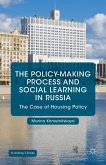This volume argues that a renewed commitment to sound macroeconomic policies and structural reforms is needed for countries in South East Europe, or 'the Balkans' achieve to sustainable prosperity, along with enhanced support from the international community. New fiscal and financial architecture has valuable lessons for policymakers in SEE.
"The book ... provides an invaluable analysis of the transition south-eastern European countries recently experienced from a planned economy system to market economy and the democratic functioning of society. The book is also a useful tool aiming at analyzing the techniques through which a more effective implementation of reforms and practices will lead to the economic growth of these countries. ... this book can be of great interest to academics, practitioners and policymakers." (George Makris, South-Eastern Europe Journal of Economics, Vol. 14, Spring, 2016)
"A thoughtful examination of the last quarter century of economic development and reform in a region which has seen the extremes of devastating war and unsustainable boom. The authors aptly use their wealth of experience and analytical skills to chart a path out of the current doldrums." Professor Erik Berglof, Director of the Institute of Global Affairs, London School of Economics, UK
"This book represents a brilliant analysis of the state of South East Europe's economy, which includes an overview of every country separately, as well as of the complex regional economic ties. The authors, most of whom during their careers had active roles in the transition process in the region, have used their vast experience and quality information provided by joint workshops with the central banks of the region, including those with the Central Bank of Bosnia and Herzegovina. All the quality information, as well as in-depth analysis, shows that this publication has potential to become essential reading for all those who want to understand the economic trends in the region during the past two decades." Dr Kemal Kozari?, Governor of the Central Bank of Bosnia and Herzegovina
"This timely book allows the interested scholar to understand how an incomplete economic transition and a capital-inflows fuelled boom-bust have contributed to the difficult situation the economies in South East Europe find themselves in today. The authors map out a new growth strategy for the region. Particularly impressive and useful are the institutional details, both at the national and European level, that provide the necessary texture to their analysis and policy recommendations." Bas B. Bakker, IMF Senior Regional Resident Representative for Central and Eastern Europe, and co-editor of, How Emerging Europe Came through the 2008-09 crisis: An Account by the Staff of the IMF's European Department
"A thoughtful examination of the last quarter century of economic development and reform in a region which has seen the extremes of devastating war and unsustainable boom. The authors aptly use their wealth of experience and analytical skills to chart a path out of the current doldrums." Professor Erik Berglof, Director of the Institute of Global Affairs, London School of Economics, UK
"This book represents a brilliant analysis of the state of South East Europe's economy, which includes an overview of every country separately, as well as of the complex regional economic ties. The authors, most of whom during their careers had active roles in the transition process in the region, have used their vast experience and quality information provided by joint workshops with the central banks of the region, including those with the Central Bank of Bosnia and Herzegovina. All the quality information, as well as in-depth analysis, shows that this publication has potential to become essential reading for all those who want to understand the economic trends in the region during the past two decades." Dr Kemal Kozari?, Governor of the Central Bank of Bosnia and Herzegovina
"This timely book allows the interested scholar to understand how an incomplete economic transition and a capital-inflows fuelled boom-bust have contributed to the difficult situation the economies in South East Europe find themselves in today. The authors map out a new growth strategy for the region. Particularly impressive and useful are the institutional details, both at the national and European level, that provide the necessary texture to their analysis and policy recommendations." Bas B. Bakker, IMF Senior Regional Resident Representative for Central and Eastern Europe, and co-editor of, How Emerging Europe Came through the 2008-09 crisis: An Account by the Staff of the IMF's European Department








